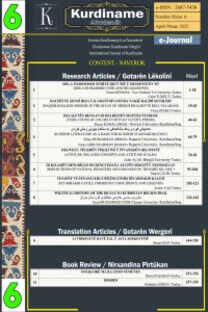ZAZAKÎ DE EDATÎ
Prepositions in Zazaki
Zazakî, Linguistics, Prepositions, Sentence Meaning,
___
- Can, M. (2012). Barkerdena Zerrî. İstanbul: Kayhan Matbaacılık.
- Çem, M. (2003). Türkçe Açıklamalı Kırmancca (Zazaca) Gramer. İstanbul: Deng Yayınları.
- Çîçek, A. A. (2012). Sayê Marû Estanikanê Xinis û Tekmanî ra. Îstanbul: Weşanxaneyê Vateyî.
- Çîçek, M. (2014). Mêşa Dengize Estanikanê Gimigîmî ra. İstanbul: Wêşanxaneyê Vateyî.
- Çiftçi, H. (2013). Uygulamalı Farsça Grameri. Erzurum: Eser Ofset.
- Dêrsim, H. D. (2014). Deyndar. Îstanbul: Weşanxaneyê Vateyî.
- Espar, J. Î. (2004). Beyi Se Bena? Îstanbul: Weşanxaneyê Vateyî.
- Espar, J. Î. (2004). Tanî Estanikî û Deyîrê Ma. Îstanbul: Weşanxaneyê Vateyî.
- Grûba Xebate ya Vateyî. (2005). Rastnuştişê Kirmanckî (Zazakî). İstanbul: Vate.
- Grûba Xebate ya Vateyî. (2005). Rastnuştişê Kirmanckî (Zazakî). Îstanbul: Weşanxaneyê Vateyî.
- Grûba Xebate ya Vateyî. (2019). Sözlük Türkçe-Kırmancca (Zazaca), Ferhengê Tirkî-Kirmanckî. İstanbul: Vate.
- ISSN: 2687-5438
- Yayın Aralığı: Yılda 2 Sayı
- Başlangıç: 2019
- Yayıncı: Osman ASLANOĞLU
DEHUMANIZATION AND OBJECTIFICATION IN THE YEZIDI GENOCIDE
NIRXANDINEK LI SER ÇÎROKÊN QEDRÎCAN
BERHEMÊN KURDÎ DI QADA FIQHA ÎSLAMÊ DA
نەورۆز لە ڕوانگەی کورد و فارس – لە توێژینەوەیەکی بەراوردکاریدا
CİZRE-BOHTAN BEYİ BEDİRHAN: DİRENİŞ VE İSYAN YILLARI
BÎBLÎYOGRAFYAYA KITABÊ HÎKAYEYANÊ KURDKÎ (KURMANCKÎ-KIRMANCKÎ (ZAZAKÎ) 2000-2020
